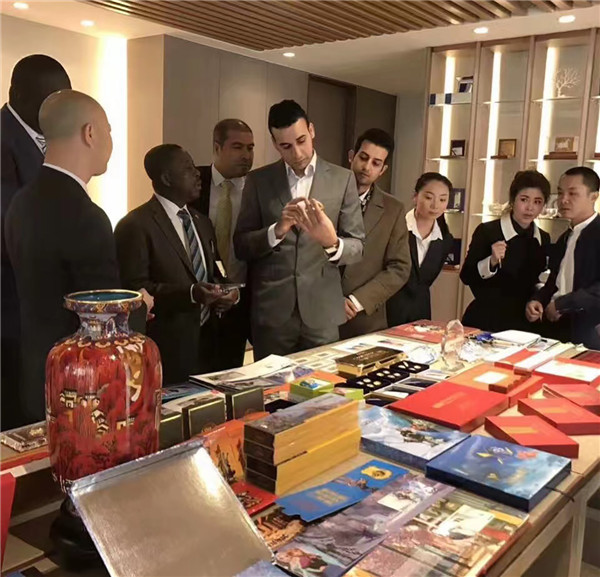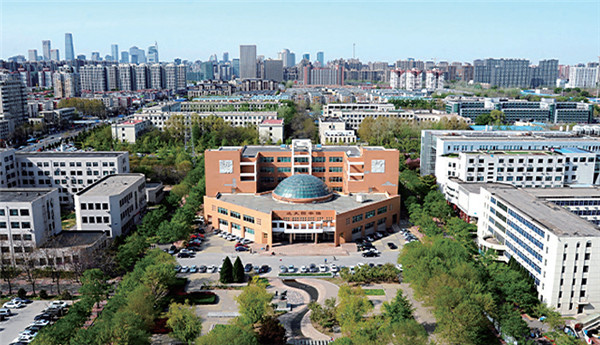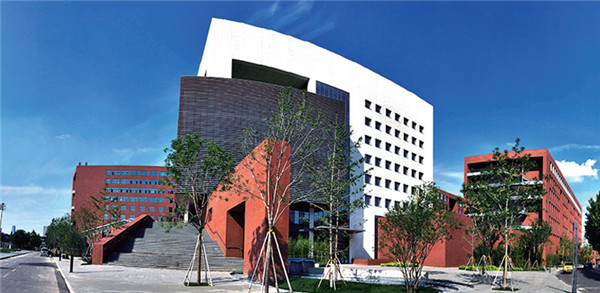探索中國語言
〔巴勒斯坦〕 哈伯 北京工業大學

來到中國留學之前我對中國文化有一定的了解。中國歷史文化包括很多,例如:婚姻、家族、國家政權、貿易、衣食、文字、文學、經學、宗教、道德、民俗、節慶等,構成一幅清晰簡要的中國古代社會生活的縮影。在中國讀書對我而言是經歷,也是歷練。畢竟,在截然不同的文化背景下,迅速適應環境對每個在外國的學生來説都是一次巨大的挑戰。
中華文化源遠流長,文化的載體漢語極富魅力,我自打接觸漢語就被她深深地迷住了。平時上漢語課一般都是老師站在講臺上,學生坐在下面聽課,但課並不一定要這麼上。生活處處有漢語,在自己探索學習的過程中,也能上漢語課。
在人類科技快速發展中,我們的語言知識的總量也在迅速發展。在電視上,我經常能看到許多有意思的廣告語,那一條又一條的廣告語,就是我們人類智慧的結晶,有的廣告商為了自己的産品銷量更高,絞盡腦汁地想讓廣告語更有吸引力。比如,蚊香廣告——默默無“蚊”,淋浴頭廣告——隨心所“浴”,電動車廣告——“騎”樂無窮……這些廣告語是通過把成語中的字換成那個字的諧音字形成的,有的人認為這是一種錯誤的做法,這玷污了中國的文化,還會誤導孩子。但有的人認為這樣做沒關係,還能做反面教材。其實無論是哪一種,都沒有關係,因為這都體現了漢語的魅力。
每一個城市都有它的方言,那些方言,體現了那個地域的文化色彩,北京的方言十分有趣,例如:昨兒個——昨天,明兒個——明天,嘛呢——幹什麼呢……在我學習語言中對於方言也是非常熱衷,這也代表了地域的文化,老北京的傳統。我看過這樣的廣告詞:外語誠可貴,方言價更高;學了普通話,兩者皆可拋。讓我不得不佩服中國人對文化的思想創意,每個地域的方言體現了每個地域的文化色彩,而這些美妙的色彩為漢語這張圖畫添加了精彩的一筆。

哈勃在北京參加國際文化交流活動
漢語學習達到一定程度,我開始涉獵詩歌,詩歌是人類情感表達的高級形式,從詩中我體會到了中國古人的高尚品德和情操。宋朝著名詩人蘇軾飽讀詩書,更被宋神宗讚為“才與李白同,識比李白厚”。一場烏臺詩案把他從朝廷貶到荒涼的黃州。他忍受的不只是惡劣的環境、同僚的排擠,還有心靈的拷問。是什麼讓他支撐下來?我想應該是他在書海中歷練出來的胸懷。蘇軾能于逆境中留下許多曠達樂觀的詩文“莫聽穿林打葉聲,何妨吟嘯且徐行”,“大江東去,浪淘盡,千古風流人物”,無不與他的廣博學識和樂觀豁達的心境有關。家喻戶曉的諸葛孔明居於一隅,卻知天下,料事如神。他博覽群書,在書海中明白了古今更疊的規律,推演出現實的變遷。於是《出師表》千古揚名,三分天下功勳卓著。
同樣,作為留學生,只有大量課外閱讀,方知中國文化的博大精深。課外大量閱讀,能煉出博大的人格胸懷。課堂所學當然有限,課外閱讀能彌補課堂不足,讓我在博覽群書中,開闊視野,增加積累,陶冶情操,提高能力。在我看來,課外閱讀才是語言盛宴的主菜。語言素養的高低差異,與課外閱讀品質的高低有密切的關係。精選好書,潛心研讀,才能讓我體會書中的精華。

北京工業大學提供
有人説“讀萬卷書,行萬里路”。詩仙李白遍走祖國大好河山,“蜀道難,難於上青天!”“天門中斷楚江開,碧水東流至此回”,孕育出了他的浪漫思想和向上胸襟,“飛流直下三千尺,疑是銀河落九天”“天生我才必有用,千金散盡還復來”。李白遊歷祖國山河的社會實踐,成就了他的浪漫詩篇。

北京工業大學提供
我希望自己也能如李白一般遊遍中國的山山水水,感受風俗人情、地理風貌。中國遼闊的土地給我帶來無限的想像和動力。實踐帶給我靈感,和人們的交流帶給我思想的火花。我會在生活實踐中去檢驗,去豐富,去完善,去提升。學習、積累,是為了運用和創造。
自強不息、與時俱進、堅韌自信,中國傳統文化恢復往日神采,讓現代中國人不僅會敲擊鍵盤,也會揮毫潑墨;不僅有科學精神,也有人文理念。這是傳統文化的創新求解,更是民族的未雨綢繆。這些都值得我們留學生學習,我的祖國也需要同樣的精神。
我愛中國這片熱土,因為語言讓我們相識,因為歷史讓我對中國抱有熱情,這是一個充滿歷史的國家,希望未來的我能了解到更多的中國歷史文化。
Explore the Chinese Language
〔Palestine〕 Ihab S.S. Adib, Beijing University of Technology
Before I came to study in China, I had a certain knowledge of Chinese culture. There are many aspects in Chinese history and culture, such as marriage, family, state power, trade, food and clothing, writing, literature, classics, religion, morality, folklore and festivals. All these elements constitute a clear and brief epitome of ancient Chinese social life. Studying in China is both an experience and a test for me. After all, it is a great challenge for every international student to adapt to the life in a completely different cultural background.
Chinese culture has enjoyed a long history. The Chinese language, the carrier of culture, is extremely attractive. I have been fascinated by Chinese language since I came into contact with it. Usually in Chinese classes, the teacher stands at the podium and the students sit down and listen to the lecture, but the class does not have to be like that. There are Chinese classes everywhere in daily life, and I can take Chinese lessons in the process of my own exploration and learning.
In the fast development of human technology, the total amount of our knowledge of language also develops rapidly. On TV, I can often see many interesting advertising slogans, which are the fruits of human wisdom. Some advertisers rack their brains to make the advertising slogans more attractive. For example, mosquito-repellent incense-silent “mosquito”, shower head-at one’s “bath will”, electric car - “ride” is endless ... These advertising slogans are formed by replacing the word in the idiom with a harmonic word, some people think this is a wrong practice, which tarnishes the Chinese culture and misleads children. But many others think the other way because it can be a counterpoint. In fact, it doesn’t matter, because it reflects the charm of the Chinese language.
Besides, every city has its local dialects. Those dialects reflect the cultural color of that region. Beijing dialects are very interesting. For example,zuorge - yesterday,mingrge - tomorrow,mane - what to do... I am also very keen on dialects in my language learning, which also represents the regional culture and the tradition of old Beijing. I have seen such advertisements: Foreign languages are valuable, and dialects are more expensive; After learning Putonghua, you can throw away both. I have to admire Chinese people’s ideas and creativity on culture. The dialects of each region reflect the cultural color of each region, and these wonderful colors have enriched the Chinese language.
When my command of Chinese language reached a certain level, I began to dabble in poetry, which is an advanced form of human emotion expression. From reading poetry, I learned the noble character and sentiment of the ancient Chinese. Su Shi, a famous poet in the Song Dynasty, read a lot in books and was praised by Emperor Shenzong as “as talented as poet Li Bai and more knowledgeable than Li Bai.” However, a poetry case in Wutai relegated him from the royal court to the desolate city, Huangzhou. He endured not only the harsh environment and the ostracism of his peers, but also the torture of his mind. What kept his survival? I think it was his mindset, which was honed in the sea of books. Su was able to leave many optimistic poems in the face of adversity: “Listen not to the rain beating against the trees. Why don’t you slowly walk and chant at ease?” and “The Great River eastward flows, with its waves are gone all those gallant heroes of bygone years.” All those poems relate his extensive knowledge and optimistic and open-minded state of brain. Zhuge Liang, a household name in China, lived in countryside, but knew the world and was able to anticipate things like a god. He also read a lot of books, through which he understood the laws of historical changes and deduced the changes in the future. As a result, hisNorthern Expedition Memorial became famous for thousands of years, and his achievement to divide the nation into three parts has always been praised.
As international students, only a large number of extracurricular reading can we know the breadth and depth of Chinese culture. Reading a lot after class can refine a broad personality. What I have learned in class is limited. Extracurricular reading can make up for the lack of classroom study, so that I can broaden my horizons, increase accumulation, cultivate my sentiment and improve my ability. In my opinion, extracurricular reading is the main course of the language learning. The difference of language literacy is closely related to the quality of extracurricular reading. If I choose a good book and study hard, I can understand the essence of the Chinese culture.
Some people say, “Read one hundred thousand books and travel one hundred thousand miles.” Li Bai, the great poet of the Tang Dynasty, traveled all over the great rivers and mountains of the motherland. His poems, such as “It is easier to climb heaven than take the Sichuan Road” and “The gate of heaven is interrupted by the River Chujiang/the eastward blue water flows back,” have bred his romantic thoughts and broad-mindedness. “The torrent dropping three thousand feet/Straight down to the valley floor/I think it must be the milky way/Spilling to the earth from heavens,” “if I was born to be useful/a thousand gold scatters and comes back again.” Li Bai’s travel practice through the mountains and rivers of his country made his romantic poems fascinating.
I hope I can travel all over China like what Li Bai did and feel the customs and geographical features. China’s vast land has brought me infinite imagination and power. Practice brings me inspiration and communication with people gives me sparks of thought. I will test, enrich and improve my life practice. Learning and accumulation of knowledge are for application and creation.
With constant self-improvement, keeping pace with the times, tenacity and self-confidence, Chinese traditional culture has restored its former glory, so that modern Chinese people can not only hit the keyboard, but can also draw beautiful pictures; There is not only scientific spirit, but also humanistic concept. It is not only an innovative solution of traditional culture, but also a national plan for a rainy day. All these concepts are worthy for international students to learn, and my motherland needs the same spirit.
I love China, because its language makes us know each other better, and its history ignites my enthusiasm for the nation. This is a country full of history. I hope I can learn more about Chinese history and culture in the future.



